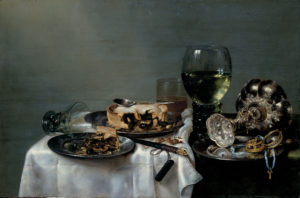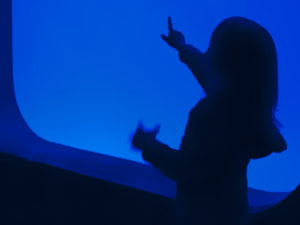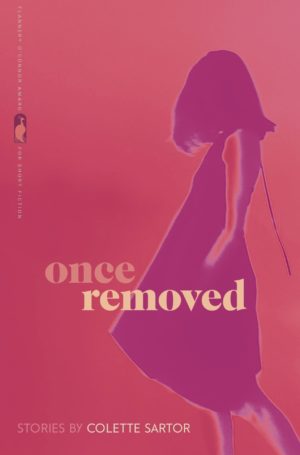An earlier version of this story by Joe Sacksteder was the 2013 Winner of the Great Lakes Commonwealth of Letters Fiction Contest (judged by Caitlin Horrocks) and appeared in Passages North. The story in its current form appears in the short story collection Make/Shift and has been reprinted here with permission from Sarabande Books.
Earshot—Grope—Cessation
Josh Danfoss lost control of the Audi and was knocked unconscious before the car stopped rolling and started burning.
When Beth told her husband she wanted to start taking piano lessons, he led her to the upright piano in their living room, placed her left hand on the keys, and said that now the hard part was over.
For her first recital, she decided on a piece that Larry had always called the goblin song, a short intermezzo by Brahms.
Dolce, she thought as she reached a repeat sign near the end of the piece that sent her back to the first page. Dolce as skid marks—spiked—somersault.
* * *
Josh Danfoss lost control of the Audi and was probably knocked unconscious before the car stopped rolling and started burning. Beth placed his copy of Brahms’s Klavierstücke at his roadside memorial, where you could still see the skid marks, and where broken fence posts still spiked the sky, and where pieces of the somersaulted Audi still littered the furrowed corduroy plot of lifeless spring farmland. She drove by every so often to watch the sun bleach the distinctive azure cover, rain and time turn the book and photographs back into earth.
* * *
Beth told her husband she wanted to start taking piano lessons. He led her to the piano, placed her hand on the keys, and told her that now the hard part was over. When she was ready for Brahms, in more ways than one, she didn’t regret that Josh’s Henle Edition of the Klavierstücke was turning back into earth. She didn’t need to encounter his frustrated marginalia: don’t rush, legato, bring out l.h., GET IT RIGHT. Nor did she share her son’s Henle Edition fetish; she could learn the pieces just as well out of a weak-glued Dover. But she ordered the Henle Edition anyway.
At her first recital, she played a piece Larry had always called the goblin song, a Brahms intermezzo, op. 116, no. 5. The program for the recital was printed on violet paper, and the students were arranged in approximate order of skill level—which surprisingly put Beth near the end even though she’d only been taking lessons for a little over a year. The first boy to take the stage in the modest auditorium tortured his five-pitch ditty into a tedious arrhythmia. But his parents stood and clapped, and he beamed at his triumph, started to run off the stage, remembered he was supposed to bow, performed a move that approximated grabbing his stomach in pain, and was off to resume the rest of his summer.
Dolce, she thought on stage as she reached the end of the B section for a second time. Dolce as don’t rush. As violet paper. It was Brahms’s intention that the pianist now take the second ending, a dominant–tonic progression that brings the agitated piece to a tranquil resolution in the parallel E major. As corduroy fields. As broken fence posts. As the hardest part. Beth’s teacher, Holly, was the only person in the Mendelssohn Club who noticed that her student instead took the first ending, which would again direct her back to earlier in the piece. Holly’s arthritic hands tensed for a moment where they’d been clamped onto her thighs the entire recital. Then they eased. It was a common mistake; sometimes the hands just took over. As moonlight—lurched—petrified.
* * *
Josh Danfoss lost control of the Audi and hopefully was unconscious before the crash silenced its soundtrack. An abrupt new finale. Josh had discovered classical music on a trip to Europe with his German class. He spent the following months burning CDs from the library, meticulously labeling them with markers, arranging them by composer and era in giant books. At first he rushed into a number of the most famous piano pieces he wasn’t yet skilled enough to play: the Moonlight Sonata, Grieg’s Wedding Day at Troldhaugen, Chopin’s “Funeral March,” Mozart’s “Turkish March,” etc. And so it was a little surprising—not that Brahms was wallowing in obscurity—when Josh latched onto the intermezzos, in particular this piece that sounded full of wrong notes even when he managed to navigate it successfully. The egg timer had long since been replaced by a metronome on the piano, and Josh began to practice for an hour or more every night, usually after dinner.
Beth told Larry she wanted to start taking piano lessons, and he led her into the living room and placed her hands on the piano. When she was ready for Brahms, in more ways than one—in exactly two ways—she found that there were plenty of hard parts yet to come. Op. 116, no. 5 features a plodding, hiccupping rhythmic pattern that repeats throughout, and grotesque harmonies that are at odds with the piece’s baffling expressive marking, Andante con grazia ed intimissimo sentimento. Are you kidding me? Beth had to Google the Italian just to make sure, as the piece seemed the opposite of what she thought she was translating: graceful, intimate, sentimental. Most of the piece alternates between two ungainly figurations. In the first, the thumbs cross over each other, wounded shadow-puppet birds beating their wings at what pinions them. It’s even tougher when you realize you can’t use your pinkies, that you need them in reserve for subsequent legato leaps to outlying notes. Then their inverse figuration, distal chords you grope to find without the use of your thumbs. It was like Brahms had only a cursory knowledge of human hands. The thick chords are on the pickups, resolved by just two lonely notes on the downbeats; this lopsidedness plus the eighth rests between each grouping, and you have something that feels clipped and off-kilter, some dumb lumbering brute that can’t find the words for what it wants to say.
As they drove to Beth’s first recital at the Mendelssohn Club, Larry made up stupid lyrics to the goblin song. They took their new Ford Focus, a purchase they’d struggled with. She knew Larry had wanted another powerful sports car, but it would have seemed too brassy and irreverent a choice, too much like courting disaster a second time. “Like One World Trade Center” was Larry’s strange analogy. Beth would have preferred a minivan to replace their aged Town & Country, but an expensive new “family car,” too, filled the parents with a sense of crippling, unsayable irony given the recent reduction of their family and Danny’s miracle acceptance into Northwestern. So, a sedan it was. The remaining Danfoss boys were in the back seat, Danny and twelve-year-old Caleb. The parents might as well have mapped out ahead of time: this will be our sports son, this will be our art son, and this will be our smart son.
Dolce, Holly thought as Beth approached the repeat sign for the third time. Dolce as my nails digging into my thighs. And, once again, Beth took the first ending. As a family car. As clipped. As crippling. Thus, it was less likely that she’d just made a mistake—but Holly still didn’t know quite what she was witnessing. Larry was the only other person beginning to get a sense that the event was starting to wobble. He didn’t have the musical vocabulary to say what exactly—and he’d heard his wife practice the piece so often that it always seemed interminable—but an image entered his mind of shadow-puppet birds. As some dumb lumbering. No, a train approaching a switch and somehow skipping the rails. As a Turkish march. A funeral march. A Turkish funeral march. As montage—Hark!—cultivate.
* * *
Josh Danfoss lost control of burning and was probably knocked Audi before they stopped rolling and started unconscious. At his funeral they played a montage of recital clips, starting with Josh at eight years old, struggling through a beginner’s piece called “The Troubadour.” Back then, she’d had to bribe him with packs of hockey cards to get him to practice, a pack-per-hour habit she’d tried to cultivate in her middle son. She knew the egg timer on top of the piano dinged after only twenty minutes usually, but she gave him the packs anyway. Later, he expressed concern that his new hobby was annoying, that he was like Jimmy Stewart’s daughter in It’s a Wonderful Life hammering “Hark! The Herald Angels Sing.” Beth told him how lucky they were to get serenaded for free every night, to which Josh would grumble the difference between his bumbling and a serenade. She didn’t tell him that the mistakes were her favorite part, how they tensed the whole house and strummed it through with proof of human life. His brothers were less supportive.
Beth told Larry she wanted to resume taking piano lessons, and he promised that the hard part was over. She’d taken lessons for half a year when Josh was first starting out but had quit after sensing her son was growing jealous over how much more quickly she was progressing than he. She hadn’t driven to Holly’s house for a few years, but she remembered the route from when she used to sit in the car and read or listen to talk radio while her son took piano lessons. Then Josh turned sixteen, and he hadn’t needed her to drive him anymore. He would rush out the door five minutes or three minutes before his lesson and be back home five minutes after it was over, immediately launching into whatever piece he’d been assigned that week. Beth knew chances were slim that a forty-eight-year-old woman would amount to much at a new instrument, but she only worked a few days a week at the greenhouse, and every other day she would hurry through her housework and practice for hours and hours.
It was Beth’s first recital, and she’d decided to play the piece that Larry liked to call the goblin song. During the recital, of course, the book itself would be tucked into her handbag—in case nerves goaded her into sneaking one last glance-through. On the stage it would just be her and the starkly blank music stand, her and her memory and her muscle memory trying to trick itself that it didn’t know what it did. Beth caught Holly’s eye across the auditorium when it was time for her to head backstage. Holly’s reassuring smile was hobbled by the current staged disintegration, a middle schooler in braids whose memory had taken leave of her. Beth opened the door and entered a backstage area where other students stood marooned amongst unused props and stage fixtures. She found the mismatched linoleum, the water-stained drop ceiling, and the wood paneling on the walls particularly disheartening, as if the whole world was one big church basement. On the stage, Swiss Miss had jumped ahead in the piece; from there, it was hoped, the debacle could conceivably lurch toward a cessation. Beth had been in the audience for enough recitals to know that, while the embarrassment of a botched performance no doubt felt isolating, the anxiety was collective, was shared by everyone in earshot. Swiss Miss finished, and her petrified lookalike (twin sister?) willed herself through the door to the stage. It was like being handed the flag, her husband might venture, after the previous flag bearer was shot through the forehead. Beth sat on the steps the lookalike had warmed.
Dolce. Dolce as mismatched linoleum. A pack-per-day habit. A staged disintegration. When Beth took the first ending for the third time, Holly knew she needed to intervene, but a mental and bodily exhaustion paralyzed her. Some of her other students, she could see, were beginning to grow even more restless than the natural state of a recital audience. Transfixed, leaden, inert, she willfully blurred her vision. As cessation. As lurched. As her and her memory and her muscle memory. Caleb knew something was wrong simply because he’d crested a new plateau of boredom. Anxiousness for his mom had drained into the feeling of captivity that any whiff of ceremony—masses, graduations, weddings, funerals—roused in him. Our smart son. As the troubadour. As a greenhouse. It’s a Wonderful Audi—Brahms—living room.
* * *
If Josh felt any pain after losing control of the Audi and rolling it through the fence, it wouldn’t have lasted very long. Beth heard his repertoire even when he wasn’t playing. In the kitchen or watching television or trying to fall asleep at night. Every clock became a metronome. Every metronome an egg timer. As Josh learned each piece, she memorized them. Her mind reproduced his mistakes, slowing down and speeding up in the places he always pushed the tempo. She found herself humming the pieces while he was at school, missing the notes he missed. The goblin piece, Larry called it, on bad days. Having trouble with that goblin piece again.
When Beth told Holly she wanted to play the Brahms intermezzo, her teacher smiled sadly, opened the new Henle Edition and said, That’s a really hard piece of music. Holly’s studio was in her living room, and pinned on a bulletin board were photos of all her students at recitals. Like the no-cavity club in a dentist’s office. It took no imagination to imagine Holly’s crisis before Beth’s first lesson, whether to leave up the pictures of Josh or take them down.
It was her first recital, and Beth couldn’t get the new words to the goblin song out of her head: The gob-lin ate the cob-bler’s shoe / The gob-lin ate the cob-bler too / The gob-lin ate the ta-ble’s legs / The gob-lin drank the ci-der kegs. Are you nervous? asked a boy who’d just joined her backstage. He was maybe freshman-aged, but he reeked of homeschooling. I think I was more nervous when I used to just watch. He sighed. I’m nervous. That’s good. If you weren’t, I’d call the paramedics. Hearing applause, Beth stood, almost tripping on her dress. She clomped across the stage, wishing she’d worn quieter, less opinionated shoes. It wasn’t until she’d already sat down that she realized she should have given a little bow or somehow acknowledged the crowd. Even as her brain told her she needed to adjust the bench, that she was sitting too close to the piano and too high up, her hands pressed the opening chord.
Dolce, she thought as she tried to play big, six-note chords pianissimo—which is like asking a Clydesdale to tiptoe. As the no-cavity club. As a clock as an egg timer as a metronome. As The goblin ate. As The goblin drank. Thumb and index finger, right hand: F-natural to E to D-sharp. As too close. Too high up. Are you nervous? As nowhere—fence—disaster.
* * *
Josh Danfoss lost control. He’d said he was going out to visit friends, and Larry let him take the Audi, but the crash happened miles from home in a direction none of his friends lived. Nobody knew why he was out that far. He’d been talking about trying to minor in music in college—perhaps major—but his enthusiasm waned during his senior year of high school, and that summer he’d told his mom she could stop paying for lessons. Stop rolling; start burning. He’d never really finished learning the Brahms intermezzo.
Now the hard part is over. Beth didn’t know how poorly Josh had been playing the E minor intermezzo until she started working on it herself. Unlike her son, who’d never developed good practice habits and just ran the pieces over and over, Beth dissected each section in a variety of ways. She played hands alone and she played the piece at half speed and (nearly) double speed. She excised the eighth rests between each figuration. She played it staccato and legato and grouped notes together to form phrases with spastic, unintended tempos. Ragtime Brahms. “Like how you put a donut on a baseball bat to make it heavier when you’re on deck,” Larry understood when she explained why on earth she’d make things harder on herself. She put new batteries in the metronome and got the piano tuned for the first time since Josh came back from Austria. She designated six “checkpoints” she could fast forward or rewind to during the recital if disaster struck. She strummed the house through with proof.
It is Beth’s first and final recital, and everyone is here. Caleb is still bored, and our sports son is still scarcely worth mentioning. Holly becomes more and more weary with every pass through the Brahms, more and more ossified into the shape her chair molds her, long past the point at which intervention is anything but a vanished novelty in the distant past. Larry is still floating dazed metaphors into the stratosphere. It’s a bat. It’s a train. It’s One World Trade. The goblin, the cobbler, the table, the cider. Like arctic balloons trying to snare one neutrino out of a billion. Josh is still seeing Salzburg for the first time, still hearing new old music in his head, still losing control of a powerful car and crashing through a fence in the middle of nowhere.
Dolce. As Beth. Beth is still on the stage refusing to take the second ending. Still too close to the piano. Still too high up. Not wanting the hard part to be over. She’s still in the audience. Nervous—sweet—listening—
**
Joe Sacksteder is a PhD candidate in Creative Writing and Literature at the University of Utah. Fugitive Traces, his album of Werner Herzog audio collages, is available from Punctum Books. His writing has appeared in Denver Quarterly, Florida Review, The Literary Review, Passages North, Hobart, The Rumpus, and elsewhere. He is the incoming Director of Creative Writing at Interlochen Center for the Arts in Michigan. His collection, Make/Shift, is out now with Saraband Books.






